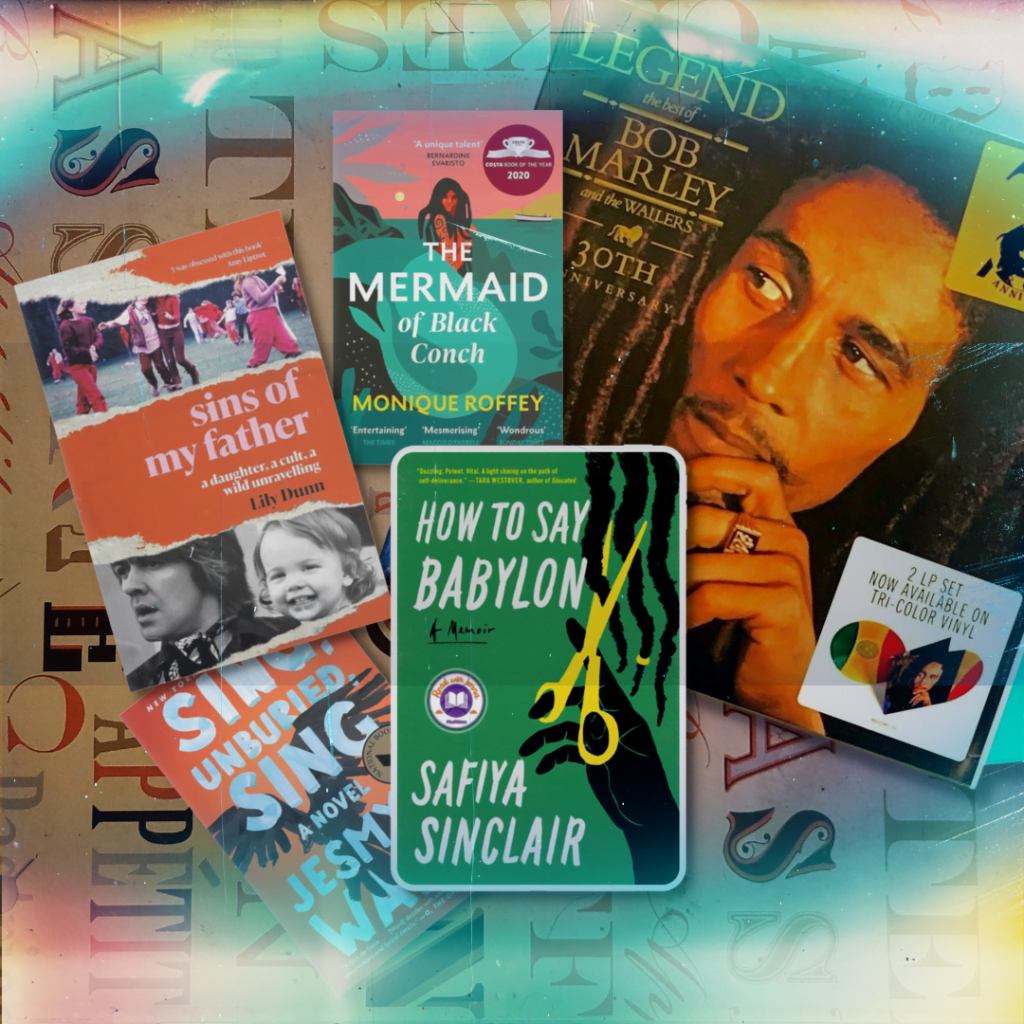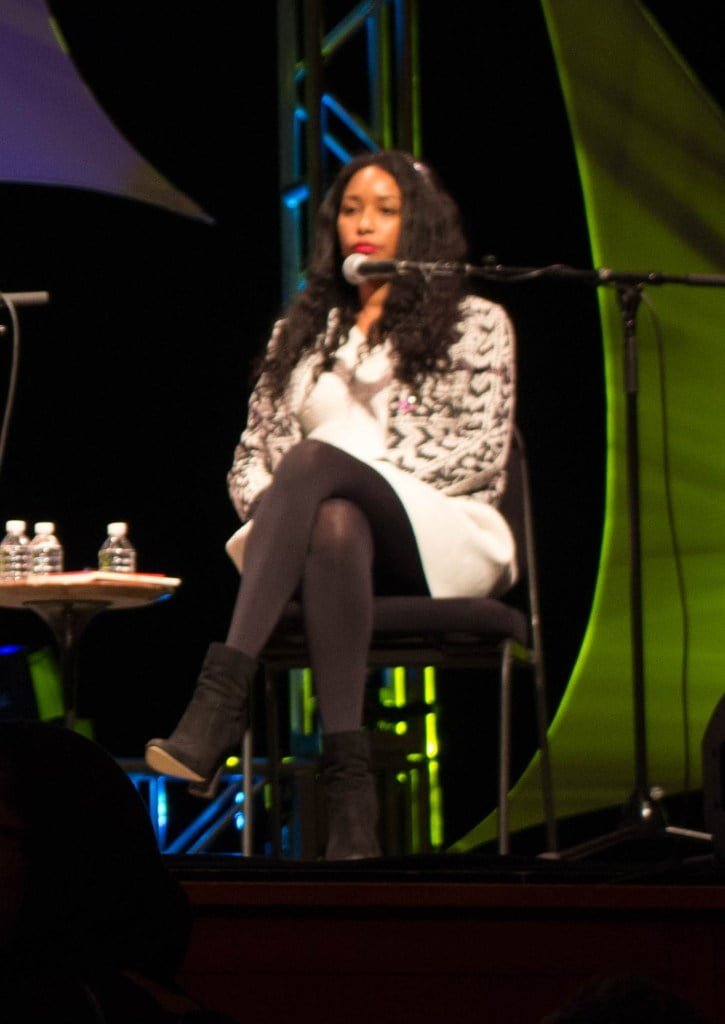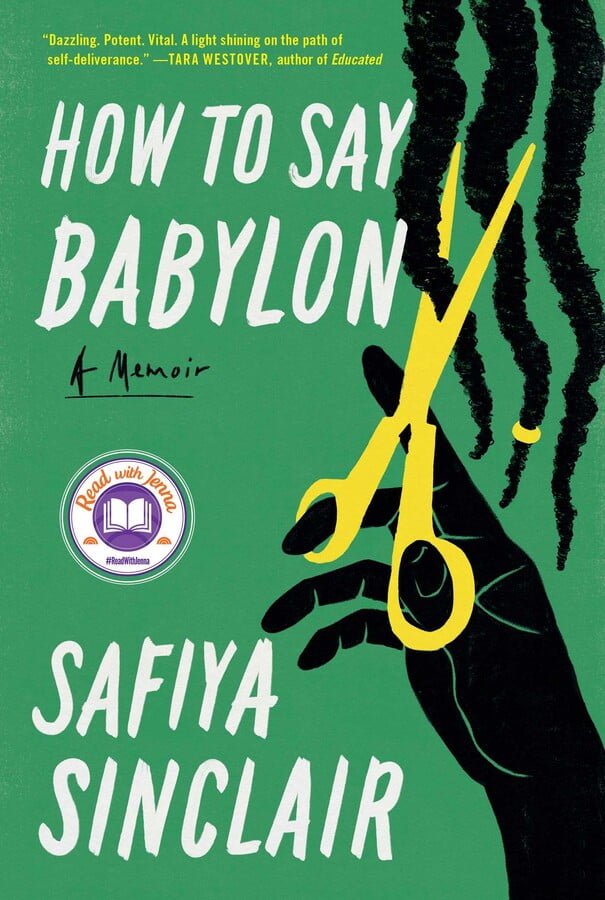We’ve had a spate of gifted writers revealing surviving a cult-like environment, from Tara Westover’s “Educated,” and “Hillbilly Elegy” by J. D. Vance. Hence, at first glance, memoirist Safiya Sinclair’s lyrical book “How To Say Babylon” was about to fall into the category of survivors’ stories. But it is so much more than a tale of woe and triumph. A phantom overshadows her evocative work about escaping an oppressive environment. However, it is the Whiting Award-winning poet‘s ability to weave a spiral staircase of words, which helps her to break free from the shackles of persecution.

“For there was nothing then beyond the half-light of the afternoon filtering in through his window, each day held like a velvet petal in my mouth.”
We love to ogle at the extremes of humanity from a safe space behind a page of a book and think, that could never happen to me. Amanda Montell, the writer behind the fascinating book “Cultish: The Language of Fanaticism,” says that our current obsession with these types of works tends to flourish during periods of larger existential questioning. While it certainly isn’t a new concept, today’s “cult followers,” like before, are mostly young, countercultural, politically rebellious types who felt the “powers that be” had failed them. They tend to turn against the norm, and look for spiritual awakening in other places. As a result, Sinclair’s book indeed falls into that genre, albeit from a different plane, as there has generally been a large focus towards white American writers in this field.
Who is Jamaican poet Safiya Sinclair and her father?
MEET THE AUTHOR
Safiya Sinclair
Safiya Sinclair is a multifaceted Jamaican talent, recognised as a poet, memoirist, and educator.


Her noteworthy achievements include the authorship of the acclaimed poetry collection “Cannibal” (2015), which garnered numerous prestigious awards such as the Whiting Award, the Metcalf Award from the American Academy of Arts and Letters, the OCM Bocas Prize for Caribbean Poetry, the Phillis Wheatley Book Award, and the Prairie Schooner Book Prize in Poetry. In 2023, Sinclair added another feather to her cap with the release of her memoir, “How to Say Babylon.” Born in Montego Bay, Jamaica, in 1984, she pursued her academic journey with a bachelor’s degree from Bennington College, followed by a master’s degree from the University of Virginia, and ultimately culminated in a doctorate from the University of Southern California.
Sinclair’s poetry exhibits a distinctive blend of vivid imagery and a profound exploration of themes encompassing identity, race, and gender. Her verses often draw from the wellspring of Jamaican heritage, interlacing elements of mythology and folklore. Beyond these endeavours, Sinclair is an educator, currently serving as an associate professor of creative writing at Arizona State University. Her teaching experience also extends to roles at the University of Virginia and the University of Southern California. The backdrop of her father, Howard “Djani” Sinclair, a reggae musician deeply entrenched in a stringent Rastafari sect, adds a compelling layer to her story, having faced “alienation” and societal rejection, shaping her journey and driving her towards the transformative power of poetry.
Breaking the cycle of generational trauma
Sinclair describes growing up in post-colonial Jamaica under a patriarchal household, her struggle for identity, and intergenerational trauma. This harrowing story delves into the nation’s turbulent history, particularly focusing on the legacy of slavery and the Rastafari movement. As a young girl growing up in this environment, Sinclair grapples with her family’s expectations, especially those imposed by her Rastafarian father, and the pull of her own aspirations and desires.
She also delves into the history of the Rastafari movement, underscoring its roots in the search for Black liberation and the belief in Haile Selassie as a divine figure. The persecution and marginalisation faced by Rastafarians in Jamaica are depicted with vivid detail, as she describes them as the “nation’s black sheep, feared and despised by a Christian society still under British rule, forced to live on the fringes as pariahs.” Hence her family were an isolated unit among an even more segregated community.
An aspect we often see within these types of books that address social turbulence, is that leaders or gurus can be godless, therefore instilling a sense of belonging, purpose and connection for those who do not fall into society’s conventions. And women tend to be at the bottom of this pile. Much of the book emphasises the need for Sinclair and her siblings to stay away from “Babylon,” the historically white-European colonial and imperialist power structure which has oppressed Blacks and other peoples of colour.
“It was a movement that hardened around a militant belief in Black independence inspired by Haile Selassie’s reign, a dream of liberation that would only be realized by breaking the shackles of colonization, and unifying the African diaspora.”
There are deep-seated conflicts between tradition and modernity, obedience and rebellion within the Rastafarian ethos that she grew up under. Rastafarians are portrayed as both outcasts and victims of discrimination. As the story unfolds, we follow her journey of self-discovery and rebellion against her father’s expectations. Sinclair delves into the complexities of her relationship with her father and her struggle for autonomy, while shielding herself from this concept of “Babylon.”
The power of writing as salvation
Her poignant reflection on her father’s control over her is symbolised by her dreadlocks and the modelling career in the US she was forced to abandon. Her account is visceral and emotional, as she states “My body had already been emptied of itself, my girlhood vanishing through the door without me,” showcasing Sinclair’s disassociation with the situation, where she had no power of her own. But beyond this, the writer uses the art of writing itself to escape her circumstance and reject “the cage my father had built for me.”
She also has her own inner struggles with the outside world, as seen when she eventually lives in the US, and the poet begins to understand the fears that her musician father had with her “walking through the inferno” of Babylon. The only sanctuary she finds is within her writing.
“There is no American dream without American massacre. Black towns burned, native families displaced, graveyards desecrated, lands stolen, lands ruined: Here is the invention of whiteness, a violence. Here is the original wound. Here I am, homesick in Babylon, and I am angry, so angry at all of it.”
Her mother had followed a similar path, having graduated high school with top marks, but her future of further schooling was swallowed up by her father, which he called “unnecessary money.” Like many young women born into poverty, the scarcity of her choices made her easy prey – just like her own daughter, and the problems of passing on pain across generations.
Read: I Can’t Save You book: depression hurts all even doctors – review
Sinclair talks about an allegory of the Rastawoman and the red thread that binds her to the past. She states: “Each night she crawls back from the dark of my memory, anchoring me to a place I have stopped trying to escape. I sputter awake and decide to face her—to reclaim my story, our family history, one sister, one daughter at a time.” By writing, she hopes to change the fate of future Sinclair girls and transform the Rastawoman’s destiny.
“I am trying to write it all down, the story of our lives, trying to change the fate of the next Sinclair girl in the retelling. With each word, I will recourse the river of my making. With each word, I will change that Rastawoman’s fate.”
Poetry is a salvation for the writer, but it is quickly tainted by the relationship with her tutor. She recounts her encounters with the “Old Poet” and the disturbing experiences she endures. The Old Poet’s actions are depicted with a chilling realism that leaves a lasting impact, and Sinclair’s use of vivid imagery, such as the “cold stamp of the Old Poet’s glass against my back, marking me,” where just like her father, the man takes control of her body, kissing and touching her without permission, and further tainting her relationship with herself.
“It was years before I revisited that ugly afternoon, and when I did, I could only do it on the page. It was longer still before I ever said a word to anyone.”
When she eventually confronts her father, we see a common moment of empowerment and catharsis in these memoirs. The reader witnesses the transformation of the storyteller from a vulnerable victim to a strong and determined individual who refuses to be silenced. At first, the author paints a vivid picture of her mother’s eventual determination to protect her child from the cycle of abuse. The line “Wherever she going, I’m going too” encapsulates the depth of maternal love and the resolve to break the cycle of generational trauma. The mother’s “quiet fury” is the final straw.
Read: Tupac Shakur biography: a life marked by struggle and death – review
“Every night I have a nightmare that you are killing me. Every single night, you have your hands around my throat, or your machete at my neck,” Sinclair then tells her father over the phone many years later after walking away from him, adding “What you did is unforgivable.” It beautifully portrays the shift in power dynamics and her resolve to break free from her past.
Intersectionality and identity in Rastafari culture
Sinclair’s connection to Rastafari and her father showcase the intersectional nature and complexity of her identity. She tells herself that “perhaps if I had felt embraced as a woman by Rastafari, I, too, would have embraced it. But I was never allowed to sit with a circle of Rasta bredren or join in on a reasoning.” Because Rastafarianism had excluded her and other women she stayed away from it, until years later when she began pulling at the first thread of this beginning. Sinclair says “I might have left Rastafari behind, but I always carried with me the indelible fire of its rebellion,” which seeps through in her writing. Her prose is the thread she will pass down to the next generation, ensuring that it includes other Rastafari women.
[…] and “breathless,” living under an oppressive system in Jamaica as a woman. We called it “evocative” in our review, as she weaved a spiral staircase of words in this haunting […]
[…] “How to Say Babylon: A Jamaican Memoir” by Safiya Sinclair, 4th Estate. Read our review of this deeply moving work. […]
[…] How to Say Babylon: A Jamaican Memoir by Safiya Sinclair, published by 4th Estate. Read our review of this deeply moving work. […]